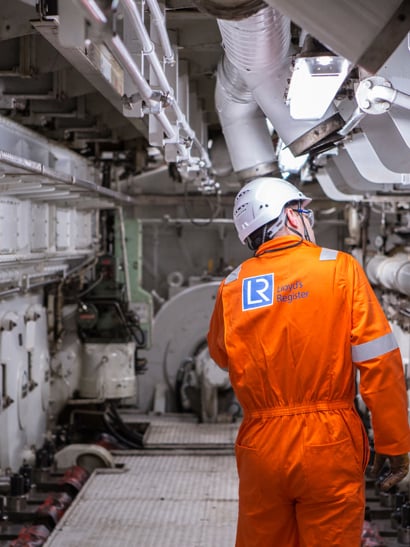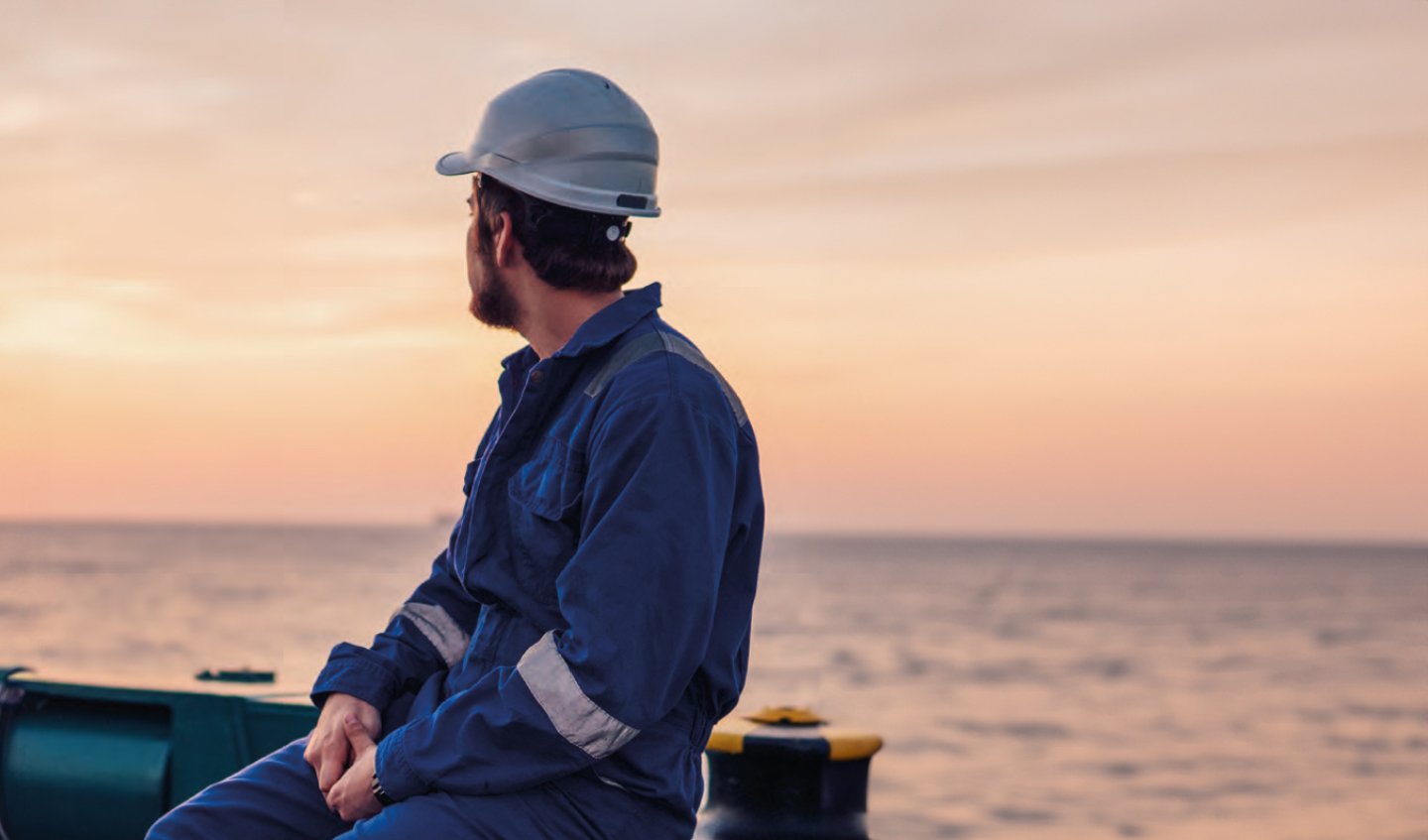The importance of creating an environment where people can talk openly about their mental health was among the key takeaways from IMarEST’s 1st Global Conference for Seafarer Mental Health and Wellbeing, which centered on practical solutions for improving seafarer welfare. Held virtually in May, the event brought together global leaders and key stakeholders from the maritime sector and was co-chaired by LR’s Stephanie McLay, Senior Human Factors Consultant, and Capt Panos Stavrakakis, Champion of IMarEST Mental Health & Wellbeing Initiative and Head of Centre of Organizational Health & Wellbeing, Health & Safety Executive. “The first step in creating the conditions where seafarers can talk openly about their mental health and wellbeing, is to get our industry talking” said McLay. “We need to raise awareness that health is more than physical, and covers a wide spectrum. Given the critical nature of the seafarer role, it is vital that there is an increased understanding of common wellbeing challenges for our seafarers, and how we as an industry can offer better support.”
The two-day event, which assessed the best ways to support seafarers as well as opportunities for improving onboard working and living conditions and pointed to the unique aspects of working life at sea. Seafarers live and work in the same place seven days a week for long spells. They can’t “go out” for a change of scene, they have short and irregular sleeping patterns, and they are subject to frequent rest disturbance from noise and vibration. They often have limited external source of emotional support, should it be needed. And they may be subject to bullying or intimidation by others. The result, for many, is anxiety, loneliness and depression. In an industry-wide survey conducted by LR, The Mission to Seafarers and the UK Chamber of Shipping last year, 54% of seafarers said that they were not being actively helped in the management of stress and fatigue. “We must create an environment where everyone in our industry feels truly valued and empowered to talk about mental health and wellbeing, without fear or stigma,” McLay added.
COVID-19 has been a double-edged sword for many across the maritime industry. On the one hand, it has caused untold mental challenges to many seafarers, unable to leave ships, go home, or see loved ones. Many have not been paid, leaving impoverished families in the poor countries which supply shipping’s labour, in dire straits. On the other hand, as the Sailors’ Society’s Johan Smith pointed out, “COVID has pushed us to a tipping point. Sceptics can no longer deny that seafarers’ mental health is now a top priority.” Looking ahead, Smith sees growing pressure on the ‘do nothing’ sceptics. There will be new emphasis placed on ethical supply chains and the vetting of humanitarian conditions onboard ship, he predicted, and technological innovation will assist in the early stages of monitoring the mental wellbeing of individuals. Despite these developments, however, human resource professionals insist that working conditions at sea would not be allowed ashore; nor would they have been possible even several decades ago. Sleep deprivation is an obvious example. But what about access to communications? Experts question how it can be acceptable today for seafarers not to be able to email or even call home. Although some improvements have been seen, there are still many thousands of unconnected ships or owners who do not allow ships’ crews to use satellite communications systems, even if they pay their way. Shipping charities often provide a vital lifeline on the ships they visit, providing free access for calls to loved ones. But their reach is limited to when they visit ships at anchorages in locations such as Fujairah and Singapore.
"We must create an environment where everyone in our industry feels truly valued and empowered to talk about mental health and wellbeing, without fear or stigma."
Applying a data-driven approach to fatigue in the maritime industry
Fatigue in the workplace is a long-standing issue and much has been done to address it – but new data-driven approaches, combined with advancement in fatigue science, can take the management of risks due to fatigue to another level. These solutions are starting to be used in sectors such as aviation and rail, however maritime lags behind – it is clear that much more could be done. To this end, Safetytech Accelerator have partnered with Thetius to develop a report which draws from applicable examples from various sectors. It illustrates the potential benefits of data-driven approaches to fatigue in the maritime industries, examines adoption challenges and concludes with a series of opportunities for improvement. Safetytech Accelerator is a non-profit established by Lloyd’s Register and the Lloyd’s Register Foundation with a mission to help collaborations solve major safety and operational risk challenges with enabling technology. Managing fatigue better is among the most important challenges it wants to address. You can download the report through the SafetyTech Accelerator website:
Fatigue Risk Management Report

The cost of doing nothing
Marine insurers, particularly P&I Clubs, are increasingly concerned at the ultimate costs associated with seafarers’ poor mental health. The risk to life is of course the greatest concern, but insurers must also have an eye on the trillions of dollars tied up in assets and cargoes crossing our oceans every day. Safe passage is their daily business. Whether it be a change of course to pick up a mobile phone signal, a navigational error of judgement that takes out a gantry crane, or perhaps just ‘alarm fatigue’ on the bridge, the probability of human error rises exponentially with stress, anxiety and tiredness. Pam Kern, who spent 18 years at sea and now specialises in seafarers’ mental health, has her own ‘Happiness at Sea Program’. She told the conference audience that a good place to start would be terminology. “We must overcome stigma,” she declared, “and words matter. Terms like ‘mental hygiene’ are unhelpful, she said. Positive psychology helps, she insisted. We should talk about ‘the drivers of happiness’ and normalise negative feelings such as guilt, shame, fear and depression. For those with an eye on the numbers, she added, analysis had revealed that attention to seafarers’ mental wellbeing has a payback as for every dollar invested, there’s a return on investment ranging from $3-$10.

Designed for wellbeing
The design of a ship plays an important role in facilitating social interaction onboard, from providing sufficient communal space for crew gatherings to creating an environment which is comfortable and encourages relaxation. Many vessels are built to achieve economies of scale, so although they are often built larger, accommodation quarters and spaces for crew to relax and socialise are not always a priority. In addition to space, factors such as lighting, temperature, ambient noise and furnishings can have a powerful impact on people’s mood and behaviour. As part of the second phase of its Social Interaction Matters (SIM) project, the International Seafarer Assistance Network (ISWAN) is working with a number of shipping companies who are trialling social engagement initiatives on board their vessels. The data and feedback from the trials will be used to develop a toolkit containing guidance for shipping companies. More information can be found on the Seafarers Welfare website:
Social interaction matters







